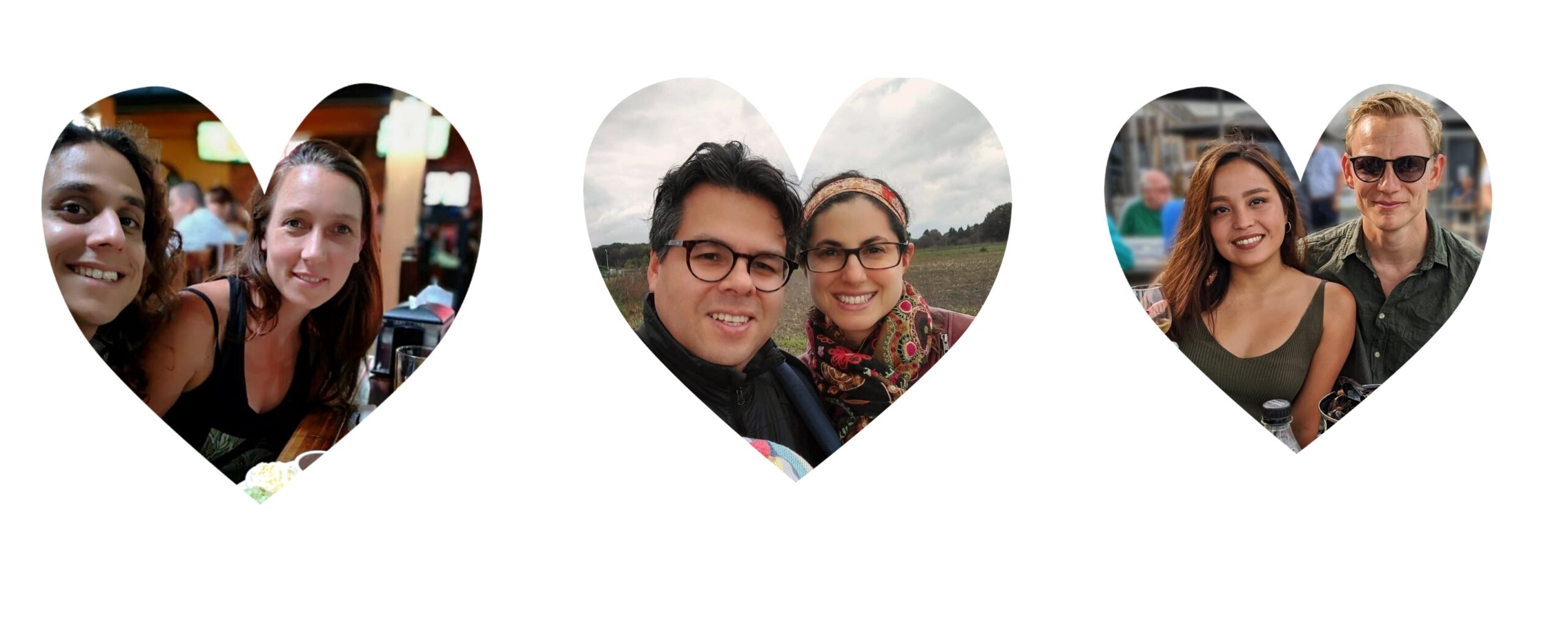If you come to Wageningen to study or to work, you get to know people from all around the world. There are people of 108 nationalities living here, according to the university’s figures. If you do manage to get a Valentine’s date in this bizarre year, there’s a good chance they come from a different country to you.
Which is all great until your sweetheart has finished their Master’s or PhD. Do you then stay in the Netherlands, move to another country, or conduct your relationship via Skype? Resource talked to three international WUR couples.
‘Wow, I thought, pretty girls here in the Netherlands’
Annemiek Pas Schrijver, a researcher at Farming Systems Ecology, Dutch; and Jean-Yves Duriaux Chavarria, a freelance consultant for ‘More People More Trees’, Nicaraguan/Swiss.
Jean-Yves: ‘I got to know Annemiek when I started on my Master’s. I had arranged a room through Skype, and she was the first person I met. I thought, wow, pretty girls here in the Netherlands! Unfortunately, Annemiek went abroad almost immediately, but I managed to ask her for a date when she was back for a short while.’
Annemiek: ‘From the start we’ve been used to a lot of Skyping. I did voluntary work in Greece, I started a PhD in Sweden, and I did most of my research in Kenya.’
Jean-Yves: ‘Meanwhile I had found a job for which I had to do fieldwork in Ethiopia. We tried to see each other there and in between times in Sweden and Wageningen. For my job it didn’t matter where I was, except for the fieldwork of course. These days I do fieldwork in Nicaragua, which means I can see my family while I’m at it.’
Annemiek: ‘We thought about moving there to live, but when the political situation changed rather drastically, we decided against it. Soon after that I got a job at WUR and we moved to Wageningen.’
Jean-Yves: ‘I really feel at home here now. There were things I had to get used to at first, like addressing Annemiek’s parents by their first names. To me that’s really impolite. And I’ve never managed to get Annemiek enthusiastic about a Michelada, which is beer with lemon juice, salt, pepper, Tabasco and Worcester sauce.
‘He is more individualistic, but I appreciate that too’
Rachelle de Vries, PhD student at Human Nutrition and Health, Filipina/ Dutch, grew up in Indonesia; and Pol Grootswagers, postdoc in Human Nutrition and Health, Dutch.
Rachelle: ‘Has our relationship affected our careers? It’s more the other way round! We got to know each other during the introductory week for PhD students, and we work in the same department.’
Pol: ‘To start with we only saw each other during breaks, which was nice, but romance only really blossomed when we went to Lowlands together. Rachelle went there to do research on food choices and she asked if I’d like to help her. Then when we went to Canada together for a project too, we became really close.’
Rachelle: ‘Through my family I already knew something about Dutch norms, values and of course the typical bluntness. We haven’t had any major culture clashes. The one thing I notice is that Pol is a bit more individualistic, while I’m used to considering other people more. But I do also appreciate that quality in him, because I would like to be a bit less concerned about what other people think of me. We both enjoy good food and we like cooking typical Dutch and Indonesian dishes. When we cook, it brings back memories.’
Pol: ‘I think it’s amazing that we grew up in totally different worlds, with different cultures and languages, and yet we find the same things important in life. I have more in common with Rachelle, for instance, than I do with my former classmates.’
‘We went on bumping into each other until we fell in love’
Vivian Valencia, assistant professor at Farming Systems Ecology, Mexican/ American; and Diego Osorio, Senior Advisor on Climate Security at CGIAR, Canadian.
Vivian: ‘We come from different countries, but we have a lot in common. We are both quite rooted in Latin American culture, and we both emigrated around the age of 12, Diego to Canada and me to the United States. We actually met somewhere entirely different: at a conference in Istanbul. It didn’t click at all between us at first but we kept on bumping into each other at conferences, in Berlin, Montreal and Buenos Aires, until we finally fell in love.
‘We’re both pretty ambitious and very driven to achieve positive changes through our work. That makes it difficult for us to find work in the same region. When I was offered a job at WUR in 2018, Diego found work at CGIAR, which was also housed at WUR. It is an international organization and he can work from any location.’
The biggest disadvantage of this kind of international family is that you don’t see much of each other, especially this year with all those travel restrictions. I had a baby in September, with a proper Dutch home birth, and we’ve been in Canada since December. So the Canadian side of the family can get to know our baby girl now, but my parents haven’t seen her yet.’

